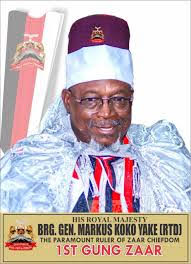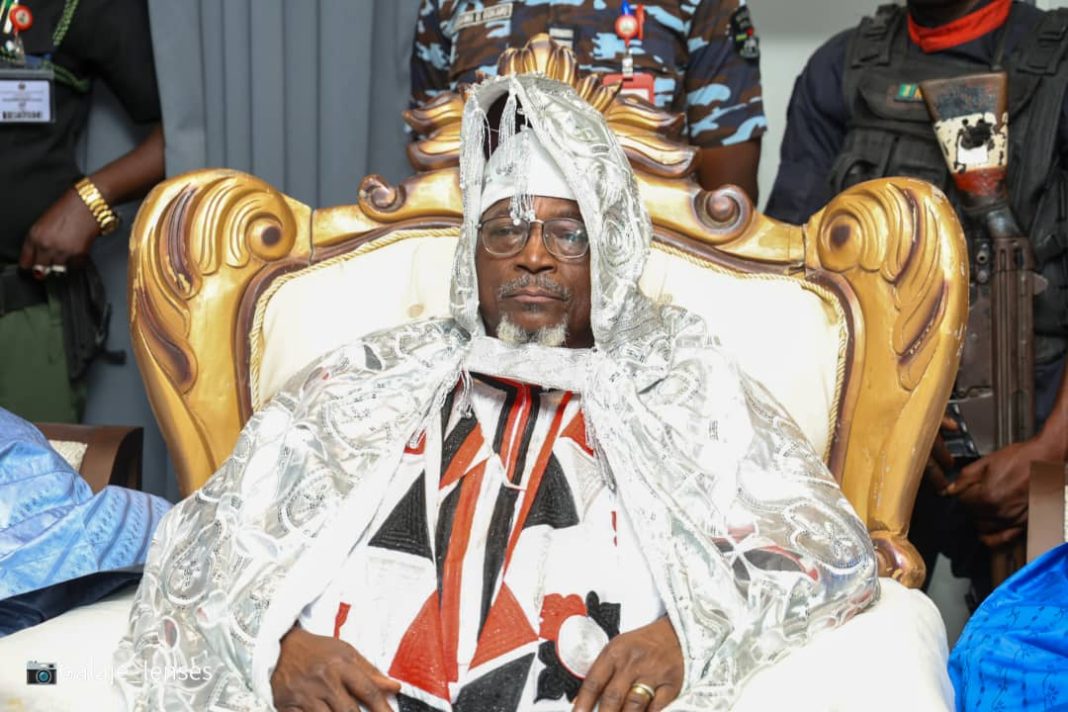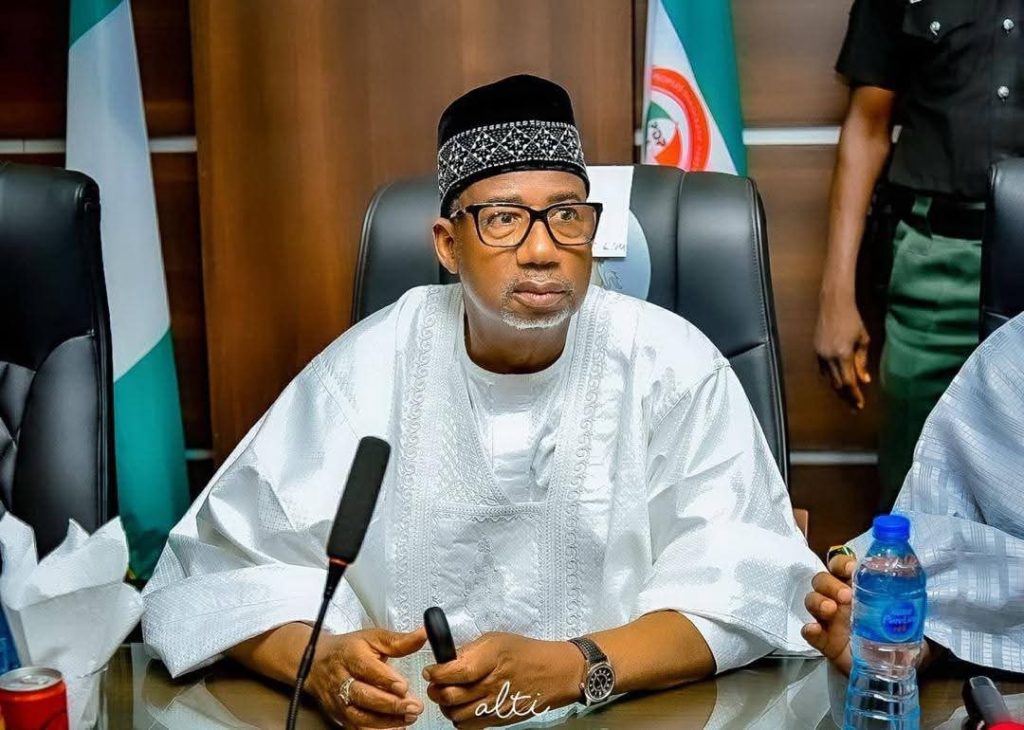The Audacity of Courage: Bala Mohammed & the Zaar Chiefdom

General Marcus Kokko Yake (Rtd)
General Marcus Kokko Yake (Rtd) sat in studied silence, his gaze fixed pensively into space, as though contemplating a matter of grave importance.
Indeed, he was.
The solemnity of the moment weighed heavily on the retired general, a man who had faced battle on multiple fronts. History was unfolding before him, and he had become a central figure—among many, both living and departed—whose roles in this long and arduous journey would remain indelible.

Gung Zaar
This historic occasion marked the formal presentation to Yake of the instrument of office as the first Gung Zaar. It was a moment shaped by decades of agitation, countless actors, peaceful negotiations, and regrettably, violent clashes that had claimed many lives. The path to this day had been anything but linear.
It was an auspicious moment—one the people had awaited with keen anticipation and restrained emotion, given the twists and turns of their chequered struggle. So, when Aminu Hamayo, Secretary to the Government (SSG) of Bauchi State, handed Yake the letter affirming him as the first Gung Zaar of the Safaya Chiefdom, the crowd erupted in jubilation.

The significance was not lost on Yake. Unlike the commanding presence he might have assumed during his distinguished military career, he chose instead to break into a Christian song—a reflection of the faith embraced by the majority in the new Chiefdom. This first-class territory had been carved out of the Bauchi Emirate Council, a predominantly Muslim domain, by the Bauchi State Government under Governor Bala Abdulkadir Mohammed.
For over half a century, the Zaar people’s quest for their own kingdom had defied resolution. Their agitation was one among many self-determination movements in Nigeria, marked by investigative panels, broken promises, harrowing violence, and dashed hopes.
To be fair, successive administrations since the return to democratic rule in 1999 had made attempts to resolve the matter—Ahmed Muazu (1999–2007), Isa Yuguda (2007–2015), and Mohammed Abubakar (2015–2019) each took steps. Yet, none succeeded.
Shortly after Bala Mohammed assumed office in 2019, the agitation reached a dangerous crescendo. Air Commodore Ishaku Komo (Rtd), an indigene of the area, unilaterally declared himself Gung Zaar, claiming the mandate of his people. However, there was no legal framework establishing the Zaar kingdom—no procedure for selecting a traditional ruler, no government instrument delineating the Chiefdom’s boundaries, and no proclamation of its headquarters. In essence, it was an act of secession—a coup by a retired air force officer. He was swiftly arrested, and the drama took a new turn. In retrospect, it was a turning point for the better.
In the aftermath of that unconstitutional move, Bala Mohammed pledged that a Sayawa Chiefdom would be established under his watch. He set the wheels in motion—and delivered. The rest, as they say, is history.
Yet, this history should have been written long ago. Had it been the deep-seated animosity, economic stagnation, and needless bloodshed might have been avoided. That all this turmoil stemmed from narrow, parochial sentiments is a cruel irony—one that underscores how the masses, in their ignorance, often bear the brunt of elite arrogance, political inertia, and power struggles.
Against this backdrop, Bala Mohammed’s decisive action to correct a decades-long injustice stands as a hallmark of responsible leadership. It opens the door to inter-ethnic reconciliation, peaceful coexistence, shared progress, and sustainable development. These must surely have been the thoughts racing through Yake’s mind—the man now entrusted with the formidable task of ensuring that Bala Mohammed’s audacity of courage becomes a lasting legacy.
As we celebrate this milestone, it is only by embracing the qualities that unraveled this long-standing impasse that we can forge a viable blueprint for building a nation where, though tribe and tongue may differ, in brotherhood we stand.
Moments like this remind us of the critical role leadership plays in nation-building. Without diminishing the valiant efforts of previous administrations in Bauchi State, it bears stating that Governor Bala Mohammed’s leadership was the most decisive factor in achieving this historic milestone.
At the heart of his success was sincerity of purpose. When a leader’s public pronouncements align with private convictions—when what is said in the open mirrors what is done in private—trust and confidence naturally follow. That trust was evident even as the widely popular, self-appointed Gung Zaar was incarcerated by the police. His people remained largely calm, not because they were indifferent, but because they saw in Bala Mohammed’s administration a genuine movement—marked by intense stakeholder engagement, civic education, and a governance environment that prioritized inclusion over exclusion.
Bala Mohammed’s reputation for inclusive governance, his insistence on leveraging Nigeria’s diversity for progress, and his innate empathy for the marginalized were key factors that enabled the successful resolution of this delicate matter.
And yes, it was a delicate project—undeniably so. There are at least three reasons why. First, the creation of the Chiefdom required carving out a portion of the Bauchi Emirate Council, effectively reducing the Emir’s domain. No ruler would welcome such a move lightly. Second, given Bauchi State’s religious composition, the reconfiguration could be misrepresented—as some have mischievously done—as an attack on the Emir or even on Islam, since the majority in the new Chiefdom are Christians. For those who interpret it that way, one can only offer sympathy, because as far as Bala Mohammed is concerned, that train left the station long ago.
By way of comparison, Bala Mohammed’s role in the creation of the Safaya Kingdom echoes his pivotal Doctrine of Necessity motion in 2010, which paved the way for Goodluck Jonathan’s ascension to the presidency following the death of President Umaru Musa Yar’Adua. Just as there was fierce resistance to the Sayawa Chiefdom, there was deep-seated opposition to Jonathan’s succession. Both episodes reveal Bala Mohammed’s character: when the issue is constitutionality, justice, and fairness, he consistently musters the courage to stand with the truth. This principled commitment to equity and inclusion defines the essential Bala Mohammed.
I recall a moment years ago when he came under fire for hosting a Christmas carol at the old Bauchi State Government House. Unfazed by the backlash, he responded that he was not the governor of any particular sect, and that the Government House belonged to all—Muslims, Christians, and adherents of traditional faiths alike. It was no surprise, then, when during a recent media tour of Tafawa Balewa Local Government, the council chairman revealed that Governor Bala Mohammed personally covered the funding shortfall for the Christian Association of Nigeria (CAN) headquarters. When a state or region is fortunate to have a leader like Bala Mohammed, peace and security are not just aspirations—they become lived realities. And when tensions arise, they are swiftly and effectively managed.
Today, while General Yake can look back with pride and assurance that the battles of the past are behind him, he must also remember that every battle leaves behind broken bones, lost lives, and lingering memories. It is therefore incumbent upon him to engage those who must now accept the new order in honest dialogue—one that affirms their dignity, respects their culture, and protects the values they hold dear.
Encouragingly, I’ve learned that the Rt. Hon. Yakubu Dogara, former Speaker of the House of Representatives and frequent critic of Bala Mohammed, was so moved by this achievement that he sent a heartfelt message of gratitude. That gesture alone speaks volumes.
Who says the creation of the Zaar Chiefdom—once thought impossible—cannot serve as a blueprint for resolving Nigeria’s many intractable self-determination agitations? As the Bible puts it, “the people rejoice when a good leader is on the throne.” That is the enduring lesson of Bala Mohammed’s administration in Bauchi State—a message to all who, despite the political theatrics of the moment, still dream of a Nigeria where the weak can lean on the strong, the poor on the rich, and the short on the tall, united as one people under God.
Finally, let’s be clear: many deep-seated problems today are either swept under the carpet or denied outright. Bala Mohammed did neither. First, he acknowledged the problem. Second, he refused to politicize it. Instead, he ignited a governance process aimed squarely at resolution. Rather than capitulate to blackmail for political survival, he chose the path of integrity—guided by conscience and honor. Third, unlike the timid posture of leaders who have plunged their domains into unending peril, Bala Mohammed, as the Kauran Bauchi, boldly wielded his mandate to orchestrate an audacious transformation—one that has redefined the history of Bauchi State and, if given the opportunity, could reshape Nigeria itself.
